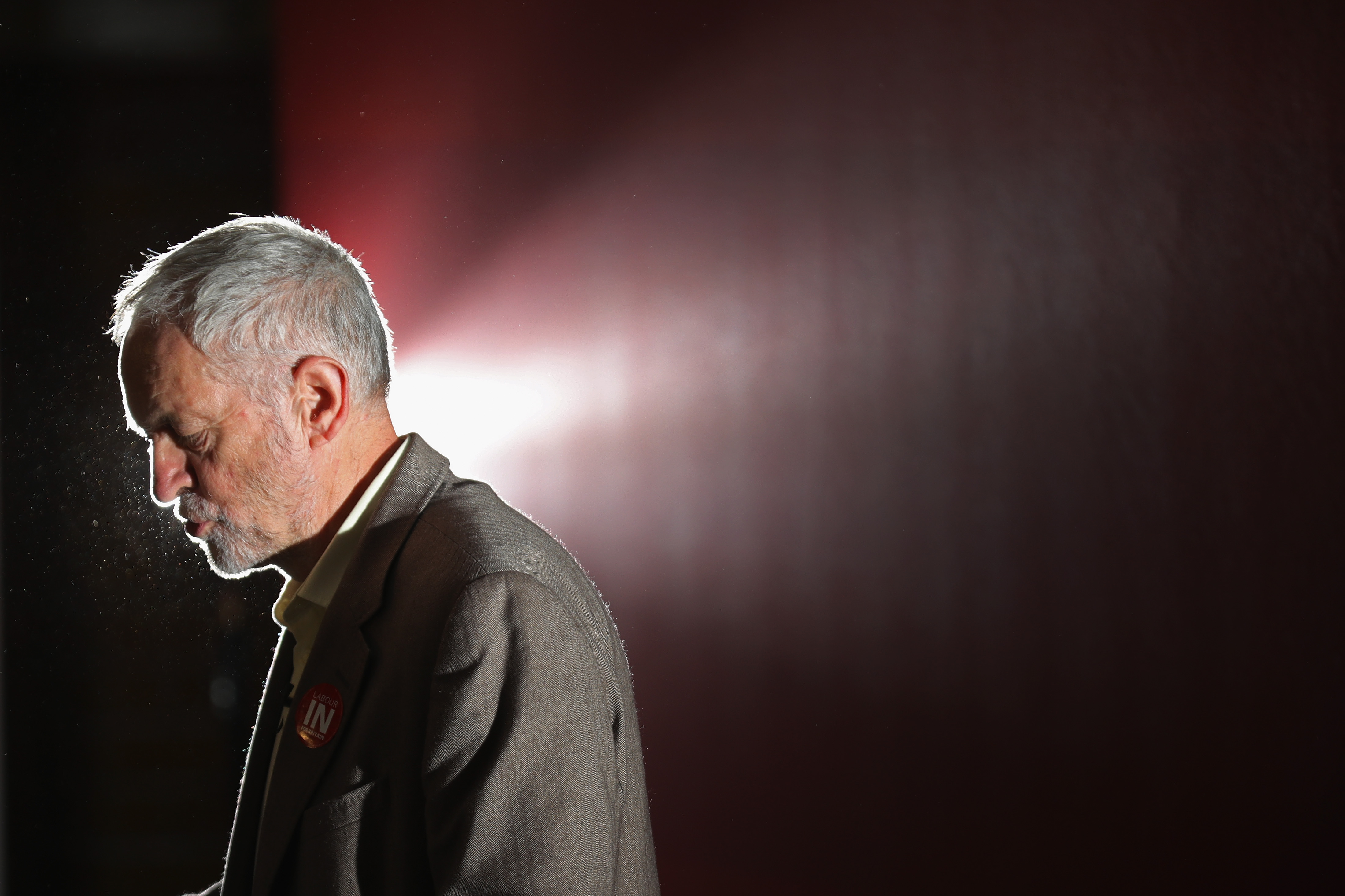Jeremy Corbyn's topsy-turvy culture war
What started as a battle for Britain's soul between metropolitan liberals and conservatives seems to have left both sides exhausted and impotent and instead emboldened hardline socialists


A free daily email with the biggest news stories of the day – and the best features from TheWeek.com
You are now subscribed
Your newsletter sign-up was successful
While the British government negotiates the greatest divorce settlement since Henry VIII took a fancy to young Anne Boleyn, the country seems paralyzed with indecision over its future.
Now that it is happening, should Britain go for a "soft" or "hard" Brexit? The former entails remaining in the single market, like Norway, and so having tariff-free access to a block that represents 46 percent of U.K. exports; the latter means going it alone on the world stage and trying to get free trade deals in time for 2019. Economic common sense only points in one direction, but the price of that is continuing free movement within the EU — and the Vote Leave campaign last year won thanks largely to immigration.
That referendum turned into a bitter and ugly culture war, a marked sign of the shifting from the traditional left/right axis towards a conflict between globalism and nationalism. Yet it has had a huge unintended consequence, too: What started as a battle for Britain's soul between metropolitan liberals and conservatives seems to have left both sides exhausted and impotent and instead emboldened hardline socialists, viewed until recently as harmless relics of a bygone age. And they may be the ultimate victors of Brexit.
The Week
Escape your echo chamber. Get the facts behind the news, plus analysis from multiple perspectives.

Sign up for The Week's Free Newsletters
From our morning news briefing to a weekly Good News Newsletter, get the best of The Week delivered directly to your inbox.
From our morning news briefing to a weekly Good News Newsletter, get the best of The Week delivered directly to your inbox.
Seven years ago the hard left was dead and buried. Then after Labour lost the 2010 election to David Cameron's Tories, the party had a choice to make. In an alternative universe, Labour would have elected the suave centrist David Miliband to party leader. He might have gone on to narrowly defeat the Tories in 2015 to become prime minister and is somewhere in another dimension meeting President Hillary Clinton for talks.
In reality, though, David Miliband was challenged by his goofy younger brother Ed, a leftist with a funny nasal voice who had the habit of making awkward faces, especially while eating bacon sandwiches. And so confident was David of winning against his hapless sibling that he did not even bother ringing a number of Labour MPs for their support. The lefty Ed won an unexpected and narrow victory over his centrist brother, only to lose the 2015 election against the odds to an unpopular Tory-led government — who by this stage had meanwhile promised a referendum on membership of the EU, in order to see off the challenge from the populist U.K. Independence Party.
Even better, Ed Miliband had helpfully changed the party leadership rules, giving the ordinary members more power, while also making it easier for anyone to join the party for just £3.
After Miliband stepped down in 2015, Labour MPs allowed the hard-left Jeremy Corbyn, until then a sort of harmless 1980s throwback, onto the ballot just to give members an alternative, almost as an afterthought — he then swept to a landslide victory. The membership has now overwhelmingly changed with the arrival of new £3 joiners, to such an extent that at this year's election Labour got the official support of the Communist Party of Britain — not to be confused with the Communist Party of Great Britain (Marxist-Leninist), with whom they are at daggers drawn. Labour moderates, always keen on open borders, found themselves now outnumbered and strangers in their own home.
A free daily email with the biggest news stories of the day – and the best features from TheWeek.com
Ed Miliband was a sort of comic figure in charge with a nerdish quality, including the ability to do a Rubik's Cube in 90 seconds; a nebish, in the words of the Jewish Chronicle editor. Even his opponents quite liked him, and just as his shadow chancellor Ed Balls has gone onto become a star of Strictly Come Dancing so Miliband has remained a popular figure in the public eye.
His successor is a somewhat different character. A man of undoubted principle, Corbyn split up with one of his wives, an exile from Pinochet's Chile, because she wanted to send their sons to selective grammar schools while he insisted on the ideologically purer comprehensive (a state school that does not screen for achievement or abilities). People of Corbyn's politics usually get called "firebrands" but he comes across more as the aging hippie art teacher people remember from school who smoked weed, which only adds to his popularity; not that he would touch anything, of course, since he's a vegetarian, teetotaling cyclist — the dark triad, so to speak.
He is also an out-an-out socialist who has expressed admiration for Chavez's Venezuela, although there is also something of the eccentric English nonconformist in him, perhaps Quakerism or one of those strange groups that arose during the English Civil War, like the Fifth Monarchists.
The most obvious parallel would be that he is Britain's Bernie Sanders, if Sanders had near-single digit support among Jews, who are perhaps somewhat put off by Corbyn describing Hezbollah and Hamas as his "friends."
Yet none of these quotes seems to get through to supporters, who, like Trump voters, regard them simply as slurs. The Labour leader also has well-publicized sympathy for the Irish Republican Army, while his shadow chancellor John McDonnell has appeared at May Day rallies with the Soviet hammer and sickle beside him. Again, these are all just slurs.
Corbyn was dismissed as a sort of fossil but he plays well to a generation who receive filtered news through social media sites, and have low levels of trust in the press generally. He is very popular among the young — overwhelmingly so with young women — and especially those who have gone through the university system.
He is a beneficiary of the "overproduction of the elites," and the excess numbers of college-educated young who cannot find the jobs or status they assumed their degrees would entitle them to and, more importantly, have no hope of ever buying a property in the country's absurdly overpriced housing market.
Yet a year ago he seemed to be leading his party to electoral suicide; they hovered in the mid-20s in the polls, and not a day went by without there being talk of a split. His followers never gave up hope, showing a devotion that is verging on the cult-like, and ignoring the fact that during the Brexit campaign the supposedly pro-Remain Labour leader was putting in all the effort of a Mariah Carey dance routine.
Corbyn in fact has always hated the European Union — his record is unambiguous on that subject — and by his inaction he probably helped to swing the referendum for Leave. Just as Thatcherites obsess with Europe holding back Britain with needless regulations and social democratic waffle, the hard-Left sees Brussels as a capitalist conspiracy, preventing governments from subsidizing failing industries and imposing other economic discipline. They disliked the Vote Leave crowd more, though, seeing them — correctly — as cultural conservatives who wished to turn the clock back.
Yet Leave's victory has been followed by a tremendously hapless government; a snap election supposed to destroy Corbyn led him to within a few thousand votes of reaching Downing Street. Theresa May's insistence on going for a hard Brexit damaged an unattractive party's only outstanding selling point, their economic management.
While polls now show public opinion in Britain moving in the direction of single-market membership over immigration controls, the Left-wing Labour leader has outflanked the Tories on the issue, telling the BBC on Sunday that under him there would no longer be "the wholesale importation of underpaid workers from central Europe in order to destroy conditions, particularly in the construction industry."
It was an old-fashioned Samuel Gompers-style argument for immigration controls, yet this despite Labour winning most of its new support at the election from the young, the university-educated, the cosmopolitan and metropolitan, most of all among Remain voters. They voted for him even though Corbyn is more eurosceptic than almost anyone in the Conservative Party, and has always been openly so. Why? Because he seems to have the ability to make people project their own fantasies onto him.
No one believes that Britain can have immigration restrictions and have the single market, but it doesn't matter; if leaving the EU proves to be an economic disaster, then even if Corbyn is in government the Tories will — rightfully — get much of the blame. Now Labour is 6 points ahead in the polls and could still yet come to power, using Brexit to mold the country in their own image, and joining a long-list of previously weak groups who have filled the void after the superpowers have exhausted themselves, from the Arab conquerors of Byzantium and Persia to the Bolsheviks in 1917.
Culture wars, like any other kind, have unintended consequences.
Ed West is a journalist and author in London who writes regularly for the Spectator. He would like to plug two history books he has out this summer aimed at young adults.
-
 The ‘ravenous’ demand for Cornish minerals
The ‘ravenous’ demand for Cornish mineralsUnder the Radar Growing need for critical minerals to power tech has intensified ‘appetite’ for lithium, which could be a ‘huge boon’ for local economy
-
 Why are election experts taking Trump’s midterm threats seriously?
Why are election experts taking Trump’s midterm threats seriously?IN THE SPOTLIGHT As the president muses about polling place deployments and a centralized electoral system aimed at one-party control, lawmakers are taking this administration at its word
-
 ‘Restaurateurs have become millionaires’
‘Restaurateurs have become millionaires’Instant Opinion Opinion, comment and editorials of the day
-
 Epstein files topple law CEO, roil UK government
Epstein files topple law CEO, roil UK governmentSpeed Read Peter Mandelson, Britain’s former ambassador to the US, is caught up in the scandal
-
 Iran and US prepare to meet after skirmishes
Iran and US prepare to meet after skirmishesSpeed Read The incident comes amid heightened tensions in the Middle East
-
 Israel retrieves final hostage’s body from Gaza
Israel retrieves final hostage’s body from GazaSpeed Read The 24-year-old police officer was killed during the initial Hamas attack
-
 China’s Xi targets top general in growing purge
China’s Xi targets top general in growing purgeSpeed Read Zhang Youxia is being investigated over ‘grave violations’ of the law
-
 Panama and Canada are negotiating over a crucial copper mine
Panama and Canada are negotiating over a crucial copper mineIn the Spotlight Panama is set to make a final decision on the mine this summer
-
 Why Greenland’s natural resources are nearly impossible to mine
Why Greenland’s natural resources are nearly impossible to mineThe Explainer The country’s natural landscape makes the task extremely difficult
-
 Iran cuts internet as protests escalate
Iran cuts internet as protests escalateSpeed Reada Government buildings across the country have been set on fire
-
 US nabs ‘shadow’ tanker claimed by Russia
US nabs ‘shadow’ tanker claimed by RussiaSpeed Read The ship was one of two vessels seized by the US military
